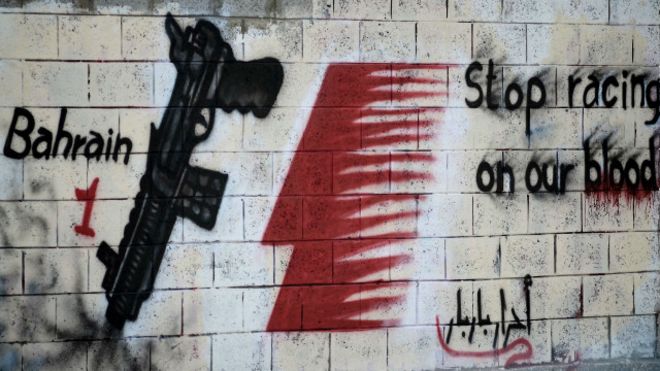Free Bahrain’s Top Shiite Cleric Sheikh Isa Qassim
Yamanyoon- 7 Dec 2017
Here, Bahrain’s most senior Shia cleric Sheikh Isa Qassim has been taken to a private hospital in critical condition after weeks of suffering from deteriorating health. Sheikh Qassim’s family and the Bahrain Center for Human Rights Group confirmed his hospitalization on Monday and said he was in “critical condition.”
He has been under house arrest for around 500 days amid daily protest gatherings in the northwestern village of Diraz which is besieged by regime forces. Bahrain’s leading political party al-Wefaq and rights bodies say the cleric, who is in his late 70s, is suffering from high blood pressure, diabetes, and heart disease.
The cleric, known as the spiritual leader of the country’s Shite Muslim majority, has been hailed as a source of inspiration for their peaceful demonstrations against the ruling Al Khalifa regime. The monarchy has killed thousands of people and imprisoned hundreds more among the protesters, who are campaigning for an elected government and a stop to discrimination against the Shiite majority. Per usual:
– These actions by the unelected regime violate Bahraini citizens’ rights to freedom of speech and assembly. Bahrain is a party to the United Nations Covenant on Civil and Political Rights. Bahrain violated Article 21 – granting freedom to peaceful assembly – by its violent suppression of the protests in 2011. Furthermore, it continues to violate Article 19, which guarantees the rights of citizens to express themselves freely.
– The regime violates this provision when it arbitrarily charges and detains citizens who criticize the monarchy. With the dissolution of Al-Wifaq, Bahrain violated Article 22, which grants individuals the freedom to associate with others. Because these actions disproportionately affect followers of Shiite Islam, Bahrain is also indirectly violating Article 18, Section 2, which protects individuals from coercion that would impair them from religious freedom, as Shiites in Bahrain continue to face discrimination and systemic oppression, yet cannot protest their status in society.
– Bahrain has stifled any form of opposition to the monarchy and regime policies. This has provided temporary stability for the regime, but history demonstrates that repression is not an effective means of maintaining a strong leadership. For Bahrain to ensure lasting stability, there must be gradual political reform that considers human rights, including space for free public dissent.
– Both the 1973 and 2002 constitutions confirm the principle of equality of all the people of Bahrain in regard to all rights: human rights as well as legal, civil and political rights and obligations. This principle in the constitution though has not been fulfilled and more disappointingly the reverse is happening.
– Even though Bahrain’s Shiites are a majority, they are represented as a minority in all constitutional and administrative branches. They occupy a proportion of only 15% of the executive branch, 12% of the judiciary, 10% of government bodies and companies, and only 1% of the security apparatus, which includes the army. Between 2011 and 2013, positions for public office like judges, ministers and advisers have been directly appointed by the orders of the King. On the flipside, thousands of Shiites have been made redundant from 2011, with discrimination against them evident in many facets of Bahrain’s society, including employment, teaching, health, and housing.
– The ruling Al Khalifa regime has endeavored to erode and downplay the religious and cultural presence of Shiites in Bahrain, and this has been attempted in many ways. Examples include senior officials’ comments and statements, media outlets and official and part-official publications. Such actions are intended to suppress the fact that the Shiites are the majority in Bahrain’s demographic. What is even more disturbing, historical and cultural sites and artefacts that relate to the Shiite identity and history in Bahrain are targeted, including grave-sites of Shiite religious scholars and shrines.
– Usually the minority are discriminated against due to an absence of the rule of law, human rights and democracy. But what we are seeing in Bahrain is a majority being treated as a minority as well as being discriminated and persecuted. The ruling sectarian regime does not even represent the minorities in Bahrain, neither politically or religiously; rather it exploits differences to target and discriminate against the majority Shiite.
It is time for the international community to have a fixed view of cases relating to human rights, democracy and discrimination in Bahrain, which is not decided by Western economic or military interests. They must oblige the Bahraini authorities to observe UN legislations and standards, and international declarations and covenants. The regime must be obliged to carry out the recommendations suggested by the Bahrain Independent Commission Inquiry in 2011 and the UN Human Rights Council’s recommendations in 2012.
These recommendations include:
– Stop the different form of support the regime enjoys from Saudi Arabia, the US and UK, especially for the continuous attempts by the authorities to cleanse Bahrain of its majority population and its policy of discrimination and marginalization.
– For the UN to expeditiously examine the case of political naturalization in Bahrain and cease the policy of political naturalization and stripping of nationality from Bahrainis.
– And for Bahrain’s case to be referred to the UN. For the UN to assume a position to sponsor a process whereby Bahrainis can enjoy their right to self-determination and freely elect their desired system of governance.

